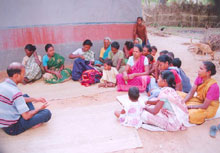 Self Help Group Members’ (SHGs) Training Self Help Group Members’ (SHGs) Training
110 SHG trainings were conducted by ICPRD along with all the 15 partner NGOs in the project districts during the project period to facilitate the implementation of capacity building programs directly to SHG members and also strengthen the base for establishing creditworthy relations with the Development Banks.
The 110 SHG Member Trainings during the project have successfully facilitated the following:
- Enabling poor Tribal Women members to understand the groups’ relevance in current scenario.
- Capitalize their strength in group formation and management particularly on attendance saving repayment leadership and record book keeping.
- Encourage the members to address the prevailing social and village based dynamics and issues and apply united group approach for their solution.
- A common understanding on role and responsibility of group members and leaders towards group and qualities of a standard functioning group.
- Emphasizing on the rotation of Saving amount for instant and emergency needs (new groups) and its investment on practiced livelihood options along with consumption needs (in old group).
- Aware and enable members to approach government bodies and Banks for justice in subsidized and other government programmes and accessibility to health credit sources respectively.
“A man siphoned off 42 kilos of Dal(lentils) from the fair price shop and took it to sell in the black market. When caught red handed he put the blame on the anganwadi workers. Believing him, the police filed an FIR against the workers. The women called for a panchayat (local self-government) against this false allegation, gathered at the police station and forced the police to retract the FIR.”. |
Mrs. Churki Soren, SHG Member |
- Providing an opportunity to share essences on group activities, case studies and livelihood selection through collective groups approach (cluster concept)
Outcomes of the Training
- Groups are having regular meetings with 70% attendance.
- They are saving regularly
- Members follow the scheduled time and date set according to their group Bylaws.
- Members participate actively on the setting of the agenda and express their views and ideas on social and PRI (local self-government) issues.
- The group members were properly managing proceedings registers. They depend less on the local moneylenders now for taking loans.
- They co-operate with one another and were united in tackling common problems faced by them in the village.
- Diversification of enterprises has been possible.
<<PREVIOUS NEXT >> |



